On the afternoon of September 24, the "UNESCO Water Family
Symposium III: Water Science Roundtable" was held during the 3rd Asia International
Water Week in Beijing. The meeting was jointly organized by IRTCES and IWHR,
with the theme of Gather consensus on the development of water sciences and
technology, and promote the preparation of the UNESCO IHP Water Sciences
Report. Zhu Chengqing, Vice Minister of the Ministry of Water Resources of
China, An Pich Hatda, Secretary of State for Water Resources and Meteorology of
Cambodia, Urmatbek Shamyrkanov, Deputy Minister of Emergency Situations of
Kyrgyzstan, and Chanthanet Boualapha, Deputy Minister of Natural Resources and
Environment of Laos, attended the meeting and delivered opening remarks. The
opening ceremony and keynote speeches were chaired by Peng Jing, Director-General
of IRTCES and President of IWHR.
The roundtable discussion was presided over by Liu Zhiyu, Deputy
Director of the Water Resources Department of the Ministry of Water Resources
and Executive Chairman of the China National Committee for UNESCO's
Intergovernmental Hydrological Programme (IHP), and Professor Philip Gourbesville,
President of the International Association for Hydro-Environment Engineering
and Research and Distinguished Professor at IWHR. Participants engaged in
in-depth discussions on topics such as flood and drought disaster management,
integrated water resources management, water environment and ecology, and water
policy.
|
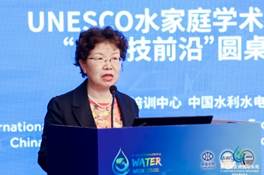
|
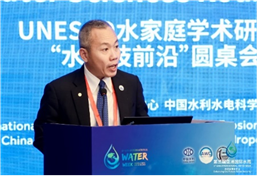
|
|
Speech by Zhu Chengqing, Vice Minister of the Ministry of Water
Resources
|
Speech by An Pich Hatda, Secretary of State of the Ministry of
Water Resources and Meteorology of Cambodia
|
|
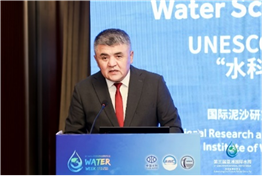
|
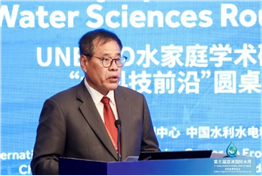
|
|
Urmatbek Shamyrkanov, Vice Minister of the Ministry of Emergency
Situations of the Kyrgyz Republic
|
Chanthanet Boualapha, Vice Minister, Ministry of Nature
Resources and Environment (MONRE), LAO PDR
|
|
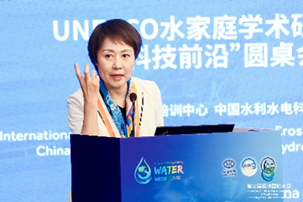
|
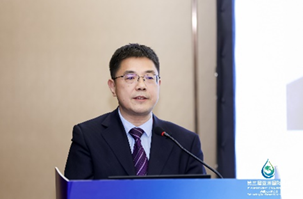
|
|
Peng Jing, President of IWHR and Director-General of IRTCES,
presided over the Opening and gave Keynote Report
|
Keynote presentation by Wang Jianhua, Vice President of IWHR
|
|

|
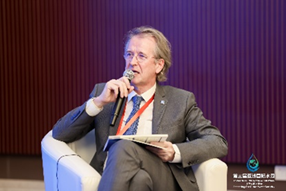
|
|
Liu Zhiyu, Deputy Director General of the Hydrology Department
of the Ministry of Water Resources, presided over the Expert Discussion
|
Philippe Gourbesville, President of the International
Association for Hydro - Environment Engineering and Research, presided over
the Expert Discussion
|
|
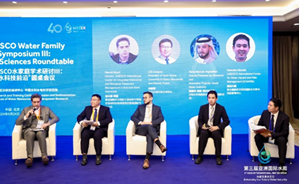
|
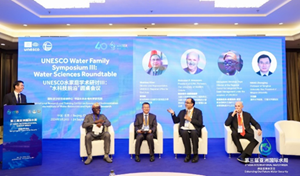
|
|
Roundtable discussion on Two Topics: Floods and Droughts, and Integrated
Water Resources Management
|
|
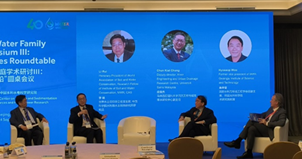
|
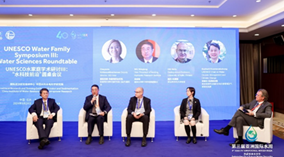
|
|
Roundtable discussion on Two Topics: Water Ecology and
Environment, and Water Policy
|
(i) Highlights
In her opening remarks, Zhu Chengqing noted that the Ministry of
Water Resources of China has deeply implemented President Xi Jinping's water
governance philosophy of "giving priority to water conservation, achieving
spatial equilibrium, promoting systematic governance, and applying both
administrative and market-based approaches." The ministry adheres to an
innovation-driven strategy, focusing on knowledge innovation, technological
innovation, and institutional innovation to comprehensively enhance the level
of water science and technology innovation. This has led to the development of
new types of water productivity, with water conservancy scientific and
technological achievements strongly supporting flood and drought disaster
prevention, efficient utilization of water resources, national water network
construction, and river and lake ecosystem recovery. These efforts have ensured
flood control, water supply, food security, and ecological security. UNESCO
plays a key leading role in water science research, and the Ministry of Water
Resources of China is willing to further strengthen water science and
technology cooperation with UNESCO, support the compilation of the UNESCO IHP Water
Sciences Report, and work together with global water partners to
continuously contribute more scientific and technological strength to the
realization of the water-related goals of the United Nations' 2030 Agenda for
Sustainable Development.
An Pich Hatda emphasized the important role of water science and
technology in economic development and called for the development of
practice-based water governance models and the strengthening of education,
training, and capacity building under the UNESCO framework. He cited various
complex scenarios that require systematic governance solutions, which are
influenced by external drivers such as climate change and human activities.
Urmatbek Shamyrkanov noted that water resources are one of the most
important resources in Kyrgyzstan and a factor affecting national security. He
called for a global rethinking of the value of water resources and the adoption
of new utilization methods, as well as continued strengthening of technological
cooperation in water security.
Chanthanet Boualapha highlighted that Laos' water management
practices have benefited from international cooperation but still face many
water security risks and challenges. He called for continued strengthening of
technological innovation, knowledge sharing, and coordinated efforts in water
resources management. He also reminded participants that the true value of
water is not only its physical properties but also its ability to promote human
life and prosperity. Each of us has a responsibility to protect our precious
water resources to leave a valuable legacy for future generations.
Peng Jing, in her opening remarks, emphasized that the world is
undergoing profound changes in the field of science and technology, with new
technologies such as big data, cloud computing, and artificial intelligence
accelerating the empowerment of scientific and technological innovation. These
technologies have become the core driving force in adapting to climate change
and ensuring global challenges such as water security, food security, and
public health. The realization of the United Nations' 2030 Agenda for
Sustainable Development urgently requires the promotion of scientific and
technological progress on a global scale, increased knowledge dissemination,
and enhanced experience sharing. As a leader in this process, UNESCO, together
with global water colleagues, continues to drive water science and technology
transformation, implement the ninth phase of the Intergovernmental Hydrological
Programme, and advance the compilation and release of the UNESCO IHP Water
Sciences Report. The Chinese water community highly agrees with this and
looks forward to contributing Chinese strength and solutions to this process.
IRTCES and IWHR will fully support these efforts, jointly explore the frontiers
of water science and technology development, and contribute to the compilation
and release of the UNESCO IHP Water Sciences Report.
During the keynote speech session, Abou Amani, Director of the Water
Sciences Division of UNESCO, and Wang Jianhua, Vice President of IWHR,
delivered keynote speeches. Abou Amani introduced the development process of
the nine phases of the International Hydrological Programme (IHP), the goals of
each development stage, and significant achievements, citing numerous global case
studies. He elaborated on why a scientific report is needed in the new phase,
emphasizing that future solutions must be based on scientific evidence. He also
explained the original intention behind the compilation of the report and the
corresponding plans for its future development.
Wang Jianhua introduced the main challenges of water resources
management in China, the innovation system of water conservancy science and
technology, future directions, and key areas of focus. He emphasized that to
build a practical and advanced water conservancy technology system, it is
necessary to integrate theory, concepts, toolkits, and practice, as well as
monitoring, forecasting, early warning, simulation, and contingency planning.
He expressed the intention to leverage China's water technology strengths to
actively contribute to the compilation and release of the UNESCO IHP Water
Sciences Report.
Following the keynote speeches, experts in attendance engaged in
roundtable discussions on four topics: "Floods and Droughts,"
"Water Resources," "Water Ecology and Environment," and
"Water Policy." These discussions were centered around the hotspots
and challenges in global water technology development, the latest advancements
in water technology, the needs for its development, and the compilation of
UNESCO's UNESCO IHP Water Sciences Report. The roundtable was chaired by Liu
Zhiyu, Deputy Director and First-Class Inspector of the Hydrology Department of
the Ministry of Water Resources, Executive Chair of the UNESCO-IHP China
National Committee, and Professor Philippe Gourbesville, President of the
International Association for Hydro-Environment Engineering and Research,
Professor at the University of C?te d'Azur in France, and Distinguished
Professor at the IWHR.
On the topic of "Floods and Droughts," Shahbaz Khan,
Director of the UNESCO Office in East Asia, pointed out that for scientific
frontiers, both droughts and floods require the integration of social sciences
with hydrological sciences, focusing not only on the social aspects but also on
the economic dimensions to provide the best solutions.
Professor Wang Zhongjing from Tsinghua University and Vice President
of Ningxia University introduced digital twin technology and the management of
new-quality water resources, illustrating his points with case studies on rural
drinking water, irrigation, and flood disasters.
Hamid Nouri, Director of the UNESCO International Centre for
Integrated Watershed and Biological resources Management in Arid and Semi-Arid
Areas, emphasized that floods and droughts should be seen as two sides of the
same coin, requiring preparedness and response plans. He called for the
development of comprehensive national plans to achieve synergistic effects in
strategy.
Daisuke Harada, from the UNESCO International Centre for Water
Hazard and Risk Management, highlighted that Japan is a country prone to heavy
rainfall, typhoons, and geological disasters. Faced with the challenges of
global climate change, Japan needs to transform and undertake top-level design
to ensure that technology serves disaster mitigation.
On the topic of "Water Resources," Slobodan Simonovic,
Fellow of the Royal Society of Canada and the Engineering Institute of Canada,
President of the International Conference on Flood Management, and Professor at
the University of Western Ontario, emphasized the significant gap between
science and application. He introduced topics such as smart water management,
the relationship between water and energy, hydrological information and big data,
nature-based solutions, desalination, water and agriculture, and digital
platforms.
Liu Junguo, President of North China University of Water Resources
and Electric Power, emphasized that water science should contribute to human
civilization by exploring how to understand, use, and manage water through the
relationship between humans and water. He listed frontier research areas in
river ecosystem science.
Omogbemi Omoloju Yaya, Director of the UNESCO Regional Centre for
Integrated River Basin Management, emphasized the need to enhance capacity
building in applied research. He expressed hope that the UNESCO IHP Water
Sciences Report would lead to better water resource management and strengthen
North-North and South-South cooperation.
Tariq Gassan Alghaffari, Deputy Director-General of the Saudi Water
and Electricity Authority, pointed out that Saudi Arabia is a water-scarce
country that needs to focus not only on technology but also on collaboration
across all sectors. He shared insights gained from China's South-to-North Water
Transfer Project.
On the topic of "Water Environment and Ecology," Li Rui,
Honorary Chairman of the World Association of Soil and Water Conservation and
Researcher at the Institute of Soil and Water Conservation, Chinese Academy of
Sciences and Ministry of Water Resources, introduced the relationship between
water resources and water conservation, emphasizing the need for research on
the impacts of soil and water protection on water resources, water quality, and
the water environment.
Chun Kiat Chang, Deputy Director of the Centre for River Engineering
and Urban Drainage at the University of Science and Technology Malaysia,
introduced the water challenges faced by Malaysia in tropical regions and
discussed nature-based solutions, specifically promoting sustainable ecological
drainage systems.
Hyoseop Woo, former Vice President of the International Association
for Hydro-Environment Engineering and Research and Visiting Scholar at the
Institute of Architectural Environment at Seoul National University, proposed
that for interdisciplinary fields, it is necessary to study the interactions
among various environmental factors, particularly the interactions between
physical, chemical, biological, and ecological aspects, as well as between
water and the environment. He also called for cutting-edge technological
research to effectively enhance efficiency.
On the topic of "Water Policy," Chayanis
Krittasudthacheewa, Deputy Director of the Stockholm Environment Institute
(Asia), emphasized the importance of cooperation among people and hoped to
strengthen good governance in water management from a policy perspective,
promoting accountable and participatory management.
Wu Shiqiang, Deputy Director of the Nanjing Institute of Water
Resources and Hydropower Research, introduced the policies and countermeasures
China has adopted in the face of challenges, especially in water resource
management, including the three red lines and rigid constraints. He also
highlighted new technological applications in policy, such as water-saving
technologies, digital twins, and unconventional water use.
Olli Varis, Professor at Aalto University in Finland, emphasized the
application of intelligent technologies, the concept of water risk,
transformation and paradigm shift, demand-side management, and ecosystem
protection.
Sucharit Koontanakulvong, UNESCO Chair in Water and Disaster
Management and Climate Change, pointed out that policy-making requires
collaboration among all stakeholders, including regional and international cooperation.
It is necessary to achieve water management through innovation and research,
capacity building, and technology exchange.
(ii) Achievements
(1) The event publicized the new progress of China's water science
and technology innovation under the guidance of President Xi Jinping's water
governance philosophy and its important role in supporting flood and drought
disaster prevention, efficient utilization of water resources, national water
network construction, and river and lake ecosystem recovery.
(2) The UNESCO IHP Water Sciences Report is a leading
initiative in the field of water science and technology, reflecting China's
active participation and leading role in this area.
(3) The participation of multiple ministerial-level leaders, UNESCO
regional center directors, Category II Center directors, Chairs, and presidents
of international organizations and universities demonstrated a high level of
attention to water science and technology.
(4) The event consolidated consensus on water science and technology
development, and the opinions and suggestions of experts provided strong
support for the compilation of the UNESCO IHP Water Sciences Report.
(iii) Reflections and
Suggestions
(1) Water science and technology plays a key role in solving global
water resource issues. Strengthening water science and technology innovation
and cooperation is an important way to achieve the water-related goals of the
United Nations' 2030 Agenda for Sustainable Development.
(2) The UNESCO IHP Water Sciences Report should be used as a
leverage to actively participate in this work and achieve a leading role in
water science and technology.
(3) Continued international cooperation in relevant fields should be
carried out to promote trans boundary and interdisciplinary research and contribute
more strength to the realization of the water-related goals of the United
Nations' 2030 Agenda for Sustainable Development.
(4) Active
participation in the ninth phase of UNESCO's Intergovernmental Hydrological
Programme should be encouraged to reflect Chinese wisdom, solutions, and
strength.

